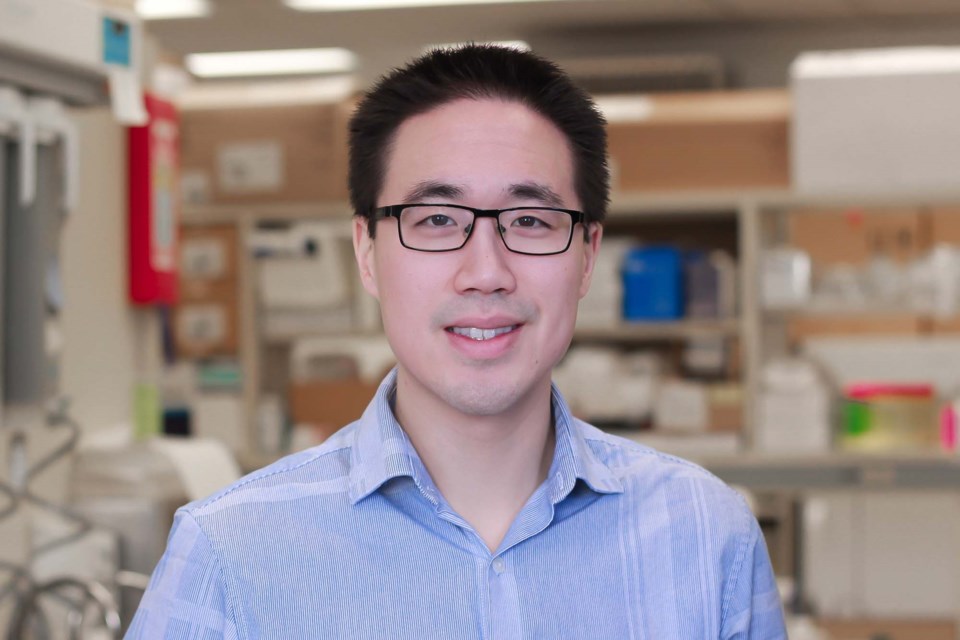Michael Chu is making super-soldiers.
They don’t look like Captain America, and they’re maybe a tenth the width of a human hair, but he’s got millions of them, and they can do something most superheroes cannot: make cancer explode.
“The basic premise is we’re changing the programming of the T-cell,” Chu said of his work as an oncologist at the University of Alberta.
“I think of it as genetically altering them to turn them from regular soldiers into super-soldiers.”
Chu, 34, is a member of the Cancer Research Institute of Northern Alberta and works at the Cross Cancer Institute in Edmonton. He’s starting a clinical trial this year of a new form of immunotherapy to treat cancer with the help of funds from the Bellerose Bikeathon.
Bellerose students heard Chu speak about his clinical trial at the 2019 Bikeathon and voted to dedicate a portion of this year’s funds to it, said Bikeathon co-founder Sue Leighton.
“I think what he’s doing is world-changing,” she said, and it could give otherwise terminal patients another shot at life.
“They (the students) are part of this lifesaving research.”
Tiny cancer fighters
Chu’s research is on immunotherapy, or treatments that enhance the body’s immune system to fight diseases. The treatment he hopes to test is called Chimeric Antigen Receptor (CAR) T-cell therapy.
Cancer cells are mutated cells that multiply with unnatural quickness, outcompeting other cells and invading organs with fatal results, Chu said. While our immune system’s white blood cells could theoretically take them out, they have to recognize them first, and cancer cells are really good at hiding their ID tags.
Chu’s research involves T-cells – white blood cells that seek cells infected with specific pathogens and explode them by releasing chemicals that punch them full of holes. If regular immune cells are infantry, T-cells are like Navy Seals – specialists trained for surgical strikes.
“The problem with chemotherapy and radiation therapy for that matter is that it’s non-specific,” Chu said, meaning they kill off many healthy cells in addition to cancerous ones.
Researchers have discovered that certain cancers wear a unique protein called CD19 on their membranes, Chu said. By hacking a T-cell to target that protein, scientists can get it to attack just those cancer cells while sparing the regular cells around them.
To do this, you first need T-cells. Chu runs a patient’s blood through a filter, resulting in a bag of yellowish-pinkish fluid full of T-cells. He then doses the cells with an engineered virus that changes their genes so they can recognize CD19.
He then lets the super-soldier cells multiply – you need about a million cells per kilo of person – gives the patient a bit of chemotherapy to make room in their bone marrow for the new cells, then injects them. The new cells move in, multiply, and spread out to hunt cancer.
A better cure
CAR T-cell therapy has proven to be at least 50 per cent effective in treating otherwise terminal cancer patients, and has proven particularly effective on acute lymphoblastic leukaemia and aggressive non-Hodgkin’s lymphoma, Chu said.
But like most super-soldiers, this therapy isn’t cheap. Just two U.S. companies currently make the modified T-cells, and they charge something like $475,000 a person. They also have to freeze the cells for shipment, which could make them less effective.
Chu plans to do a trial with 56 patients this September to see if he can do this treatment using locally grown cells. (The trial was supposed to start in June, but has been delayed due to the coronavirus pandemic.) Those cells should be better cancer fighters, as they’ll be fresher, and should be a lot cheaper – just $55,000 per patient.
“For the same price as one patient going through (in the U.S.), we can have 10 patients locally.”
CAR T-cell therapy doesn’t yet work on all cancers, as not all of them have unique protein markers, Chu said. Still, research is advancing rapidly, and he’s confident it could soon replace many forms of chemotherapy.
Research is difficult, expensive and time-consuming, and the efforts of fundraisers like the Bikeathon make it possible, Chu said.
“Every dollar they raise is going towards a potential life-saving therapy.”
Chu said he hoped to see initial results from his trial later this year, and to have the cheaper therapy approved for use within a year.




